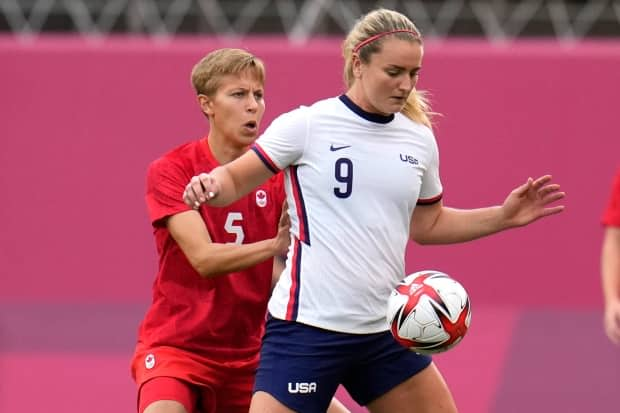Canada's Quinn to become 1st openly transgender, non-binary athlete to win Olympic medal

Canada's appearance in the gold-medal match in Japan won't be the only first for the women's soccer team when it takes to the pitch Friday (10 p.m. ET on Thursday in Canada).
Quinn, a 25-year-old midfielder from Toronto, will also become the first openly transgender and non-binary athlete to win an Olympic medal, as the team is assured of a gold or silver.
Quinn came out publicly as transgender in a social media post last fall, changed their pronouns to they/them and now goes by one name.
Since Canada's 1-0 semifinal victory over the United States on Monday at Kashima Stadium, setting up the final against Sweden, Quinn said they've been "getting messages from young people saying they've never seen a trans person in sports before."
Quinn played college soccer for Duke University in North Carolina, and is the highest-drafted Canadian in National Women's Soccer League (NWSL) history — taken third overall by the Washington Spirit in 2018. They now play for the OL Reign.
They won the bronze at the 2016 Games in Rio and were also on the squad that suffered a heartbreaking loss to the U.S. in London in 2012.
Quinn came out last September, telling The Canadian Press it was partly because they were "tired of being misgendered" in society and the media, and also to be a "visible figure" for younger people who may be "questioning their gender, exploring their gender."
WATCH | The debate on transgender athletes at the Olympics:
New guidelines coming for transgender athletes
At these Games, another transgender athlete has helped spark a conversation about greater inclusivity in sports. New Zealand's Laurel Hubbard, the first openly transgender Olympic weightlifter, competed Monday in the women's +87-kg category, but was knocked out of medal contention by failing to complete a lift in the first portion of the event.
"Of course, I'm not entirely unaware of the controversy which surrounds my participation in these Games," Hubbard said after exiting the competition. "And, as such, I'd particularly like to thank the IOC [International Olympic Committee] for, I think, really affirming their commitment to the principles of Olympism, and establishing that sport is something for all people. It is inclusive. It is accessible."
In 2015, the IOC established a set of regulations for transgender athletes in the Games. It has said it will release updated guidelines in the coming months.
For Quinn, being an advocate and a role model is not new. While at Duke, Quinn sat on the board of the school's chapter of Athlete Ally, an organization that aims to foster equal opportunity in sports regardless of sexual orientation, gender identity or expression.
"Athletics is the most exciting part of my life and it brings me the most joy," Quinn told CBC Sports on Monday.
"If I can allow kids to play the sports they love, that's my legacy and that's what I'm here for."
WATCH | Redemption 9 years in the making — Canada to play for women's soccer gold:

 Yahoo Sports
Yahoo Sports 